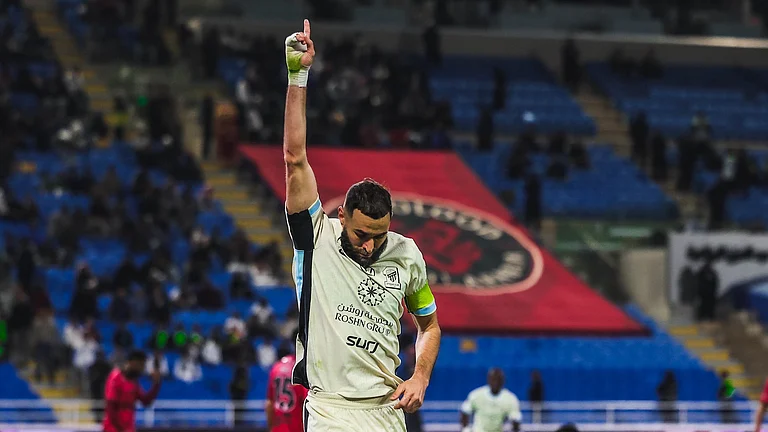Women in the Indian Foreign Service have decidedly broken through the glass door of paternalism and protection, shattering one of the last remaining outposts of male exclusivity to become India's ambassadors in capitals so far considered too important, too tough or too dangerous for them. From Beijing to Berlin, from Beirut to Doha, women are flying the Indian flag, facing challenges of war and staring down rivals at the negotiating table. The sari no longer means having to say sorry to difficult assignments.
Women are heading 26 Indian missions and consulates around the world—an impressively large number that includes the hitherto forbidden Arab world where even the West rarely sends women diplomats. Today, Nengcha Lhouvum is India's ambassador to Lebanon where she has seen bombs explode from her balcony (see Bullets InBeirut). Meera Shankar represents India in Germany, and is seen as a frontrunner for the position of India's next permanent representative at the UN in New York. In China, it's Nirupama Rao who reads the intricate tea leaves for India, managing the often tense relationship between two Asian giants. Deepa Gopalan Wadhwa is getting ready to be the first woman envoy to Qatar where most of her counterparts will be in dark suits or the white robes worn by Arab men. She hopes to reach a part of Arab society that other ambassadors can't access—women, who are increasingly a voice in this more open among Arab countries.

Nirupama Rao has a high-profile and sensitive job as the ambassador to China
To Libyan strongman Muammar Gaddafi's citadel, India has sent Manimekalai Murugesan, while the Indian High Commission in Australia is headed by Sujatha Singh. No territory seems forbidden or forbidding anymore. Important consulates from New York, where Neelam Deo is the consul general, to Shanghai, where Riva Ganguly Das is preparing to make her mark, are all headed by women. They're telling and living the story of India, procuring oil and defence deals, and hobnobbing with presidents and prime ministers around the world. And why not? As Nirupama Rao said, "It marks a very healthy stage in the evolution of the foreign service. It shows confidence in women who are being entrusted with serious responsibilities."
Ruchi Ghanashyam, India's high commissioner to Ghana, can vouch for that. Considered extremely bright, she was the first woman officer to be posted to Islamabad at a time when harassment of Indian diplomats was routine and life wasn't just wine receptions and picking on delicate hors d'oeuvre. Ghanashyam also served in Nepal and India's mission in New York. She hasn't experienced any gender bias and says she has been treated as a professional all along—a sentiment voiced by many occupying the upper layers today. India appointed Chokila Iyer its first woman foreign secretary in 2001, a move seen by many as tokenism but nonetheless, it was a first.

Deepa Gopalan Wadhwa, ambassador designate to Qatar
But it wasn't always like that. Rewind just thirty years when women faced unapologetic prejudice in those cavernous corridors of South Block where they walk with confidence these days, their saris rustling and mobiles ringing. There was a time when IFS women had to give a written undertaking that they would resign if they married. The blatantly unfair rules were changed thanks to India's first woman IFS officer, C.B. Muthamma, who moved the Supreme Court in 1979 to protest the rampant gender bias and won. Justice V.R. Krishna Iyer wrote a scathing indictment of service rules, finding discrimination against women in "traumatic transparency".
Muthamma lived in a lonely world, fighting "persistent, devious and inane battles" against the establishment. The rules were written by men for men, and women were the "also-rans". In her book, Slain by the System: India's Real Crisis, she recounts, "when the rule permitted a single head of mission to take a close female relative at government expense as a hostess, I was refused permission to take my mother, since the rules referred to a "he" not a "she"".
It's also sobering to recall that less than 30 years ago, the then foreign secretary, Jagat Mehta, didn't think twice before shooting off a three-page letter to women officers which told them that if they wanted to continue in the service, they couldn't expect to be posted where their husbands were serving. Women officers were seen as the problem, not men who also sought preferential postings on various grounds. Only when the 40-strong women contingent threatened to take the matter to court did Mehta withdraw the letter.

Neelam Deo, India’s consul general in New York, with mayor Michael R. Bloomberg
Over the years, attitudes have changed at both ends. There are now 92 women in the 620-strong IFS cadre who can pull their weight. As Neelam Deo, consul general, New York, explained: "My generation was no pushover, but the biases were more implicit. In their heads, they (the IFS men) were being protective of women but they ended up excluding them." Deo, who was ambassador to Cote d'Ivoire when violence erupted, says stereotypes must be challenged all the time. "We don't send women to countries where we think the local culture won't accept a woman in a position of power. But we're forever sending them to northern Europe because we think Europe can 'handle' women." Incidentally, Deo, one of the sharpest officers, has been ambassador to Denmark, a comfortable post but certainly not where India's real battles are being fought.
The real plums in terms of foreign policy are the neighbouring countries, Russia, the US and China. Slowly those ramparts also are being breached by women. Rao is in Beijing at a time when India needs China's support for the Indo-US nuclear deal. She was there when Tibetans in India were protesting, making China see red and feel flustered at all the negative attention. It couldn't have been easy to respond to summons twice in one day by the Chinese foreign ministry, but Rao insisted it was perfectly kosher, given the sensitivity around the Tibet issue. "When the situation demands, you respond," she says.
"Today the rules are extremely fair and women don't want special treatment," said Wadhwa from Stockholm where she's ending her ambassadorial tenure before moving to Doha. "I keep house and do a reception for 300 people. I have reared children. In some ways, far more is demanded of women." But in the end, India's women envoys find immense satisfaction in representing a country that is growing, changing and is a living social experiment. "Today people come to you in the developed world. I'm in demand not because I'm me but because I represent India." Ghanashyam adds another important note: "It's a matter of pride that I live in India House at No. 1 Jawaharlal Nehru Road in Accra. As a young girl growing up in Bhopal, I didn't even know we had women diplomats."


























